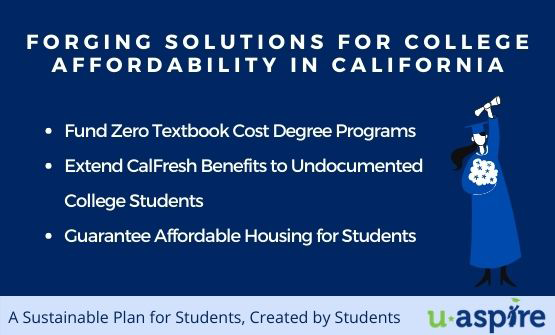Blogs
Forging Solutions for College Affordability in California
April 21, 2021
By Carlos Figueroa, Jesus Gomez, Joanne Park, Gerald Richardson III, Diamund White, Tyler Wu

A Sustainable Plan for Students, Created by Students
For many people, going to college is a make-or-break deal for their livelihoods. As students attending California colleges and universities, pursuing a higher education for us is an opportunity to prepare for a career and break cycles of intergenerational poverty. Often overlooked are the financial hurdles that students face when striving to attain a college degree or certificate. There are a variety of unexpected and hidden expenses for college students such as locating affordable housing and costs for course materials. As uAspire California Student Advocacy Fellows, we propose that California’s lawmakers fund Zero Textbook Cost Degree programs, extend CalFresh benefits to undocumented students, and guarantee affordable housing for all students.
The Problem
To remain the fifth largest economy in the world, 60 percent of California residents must have a college credential to meet workforce demands by 2030. According to the Campaign for College Opportunity, meeting this goal will generate an additional $133 billion in federal and state revenue. However, the total cost of going to college continues to create barriers for California’s college students. In 2018-19, nearly one in three college students in California reported food and housing insecurity with Black students indicating the highest levels of housing insecurity (47 percent) and food insecurity (54 percent). The college affordability crisis has been exacerbated since the COVID-19 pandemic. New data reports that as a result of the COVID-19 pandemic, over 70 percent of California’s students lost some or all of their sources of income and 73 percent are concerned about their financial situation. This includes their anxiety to pay for costs associated with food, housing, and transportation. As lawmakers champion policies to recover from the pandemic, it is imperative to prioritize investments to support students in paying for costs beyond the college bill.
Policy Recommendations
Fund Zero Textbook Cost Degree Programs – The ever-growing cost of textbooks afflicts low-income students across the state. These compounding expenses that are not calculated into financial aid disbursements are a burden that cause many students hardship. Students should not need to choose between meals and required textbooks for class. California’s lawmakers must fund Zero Textbook Cost Degree programs to increase access to course materials students need in order to successfully complete courses resulting in the upward trend of retention and graduation rates.
Extend CalFresh Benefits to Undocumented College Students – California acknowledges food insecurity on college campuses but many of these students are unaware that they are eligible to receive CalFresh. The state also excludes about 92,000 undocumented students from public assistance benefits. To make steps towards equitable solutions to alleviate food insecurity, California should ensure CalFresh works better for all eligible students and extend this benefit to undocumented college students. As the state with the highest number of undocumented students in higher education, California should step up and be the first to provide these benefits for thousands of undocumented students.
Guarantee Affordable Housing for Students – Given that 60 percent of community college students and 48 percent of students at four-year institutions face housing insecurity, a multi-pronged strategy must be executed to guarantee affordable housing for students. To alleviate the housing-related financial burdens for students, the Cal Grant award should increase every year based on the growth in student living expenses. Second, Cal Grant awards specifically for students living off-campus with financial need should also be increased to subsidize housing units close to college campuses. Third, every public institution of higher education should offer at least one cooperative housing option or affordable housing unit for students.
Call to Action
Students are facing overwhelming financial barriers when it comes to completing their college degrees. With housing, food, and transportation insecurity running rampant, state resources have not been sufficient to effectively address these needs for all students. Policymakers need to tackle these challenges college students face by funding Zero Textbook Cost Degree programs, extending CalFresh benefits to undocumented college students, and guaranteeing affordable housing for students. Without critical policies to make college affordable, California jeopardizes the success of students with avoidable obstacles. Together, we can remove these barriers and forge a path that promotes the future generation of this country.